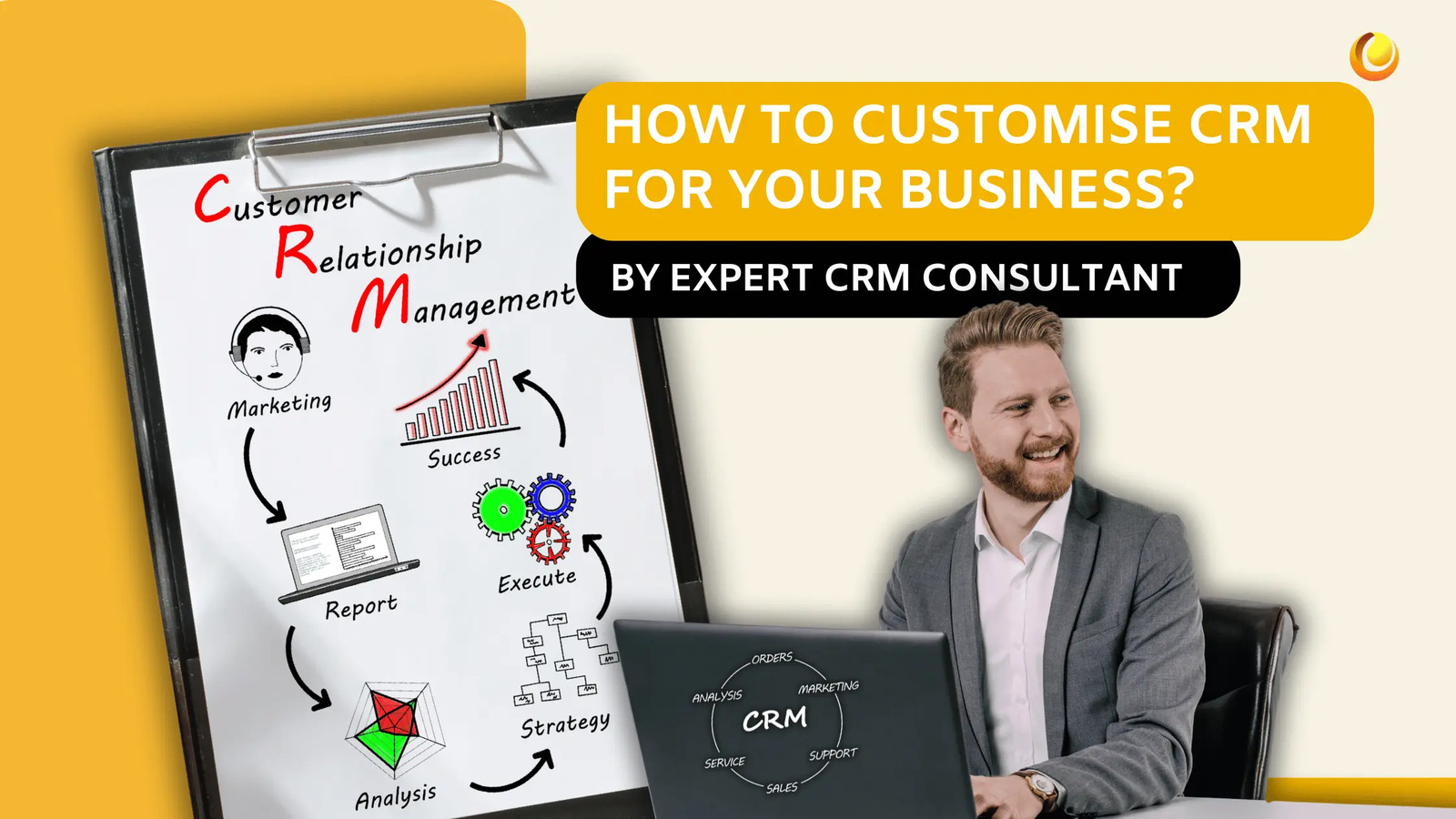
Introduction
Customer Relationship Management is such an important tool in managing and analysing customer interaction that has been developed to promote relationships with the customers, however, needs skills when implemented accurately. Here emerges the role of an expert CRM consultant. The CRM consultantwould be able to help businesses, first, grasp the difference between a functional CRM consultant and a technical CRM consultant.
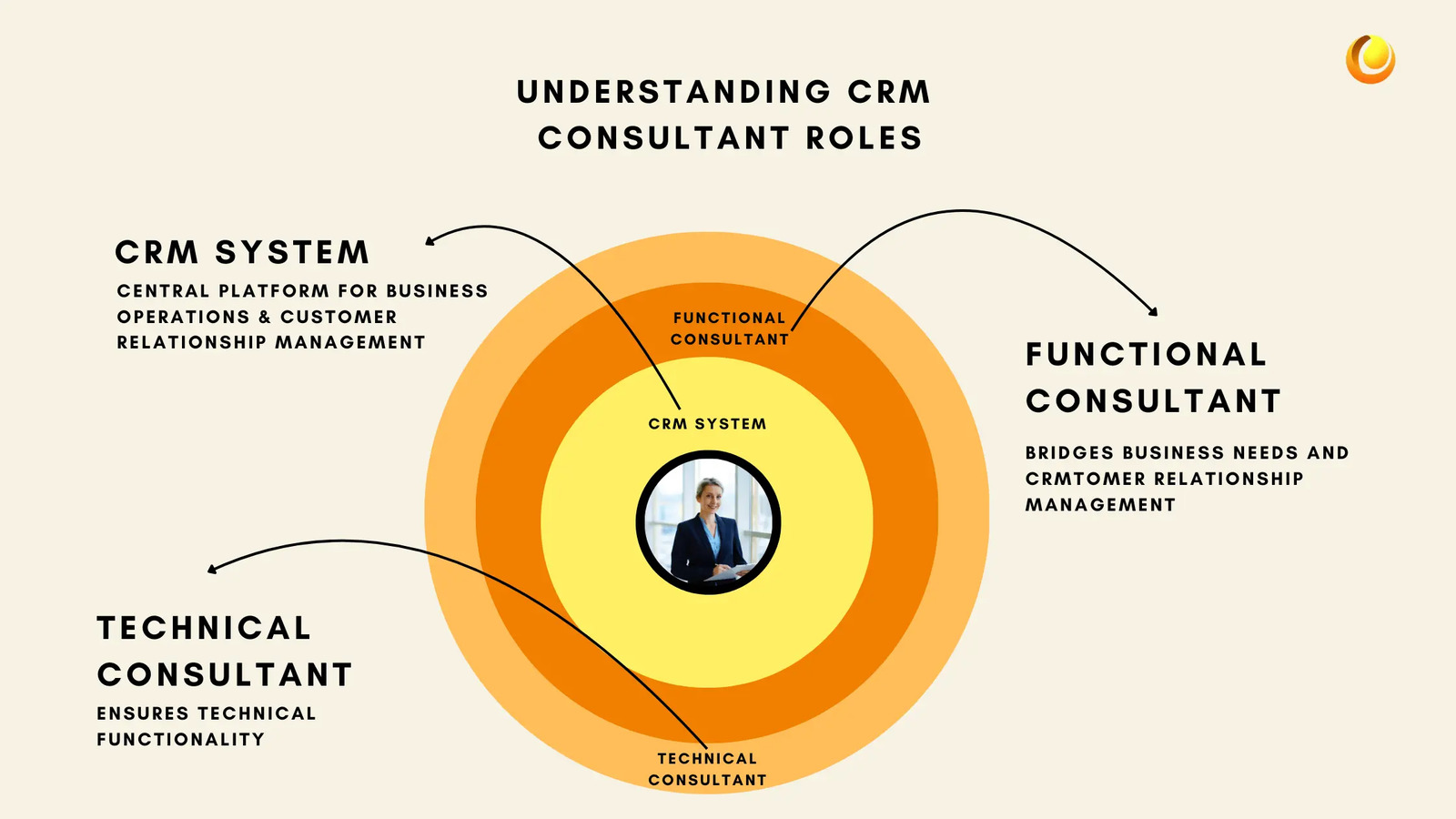
What is a Functional CRM Consultant?
A functional CRM consultant pays more attention to the business process and the operations part of CRM systems. They will make sure the CRM is well in line with the goals, processes, and workflows of the company. It means understanding what business requires, which functionality of CRM these requirements could map to, and ensuring value delivery from CRM to improve business operations. In brief, a functional consultant is almost like a bridge that crosses over the divide between the business and the technical teams.
What is a Technical CRM Consultant?
A technical CRM consultant is a person who will be held accountable for the technical configurations and customisations of the CRM system. They focus on the system’s architecture, data structure, and integrations with other tools and platforms. Technical CRM consultants work closely with developers to ensure the CRM functions smoothly from a technical standpoint, often dealing with tasks such as data migrations, integrations, and custom coding to meet specific business needs.
What Does An Expert CRM Consultant Do?
An expert CRM consultant plays a significant role in helping businesses manage and optimise their customer interactions. The growing importance of customer-centric business strategies has made the role of a CRM consultant indispensable in ensuring that businesses not only meet but exceed customer expectations. Diversified in various phases of CRM implementation and management, this role brings both functional and technical expertise to CRM systems.
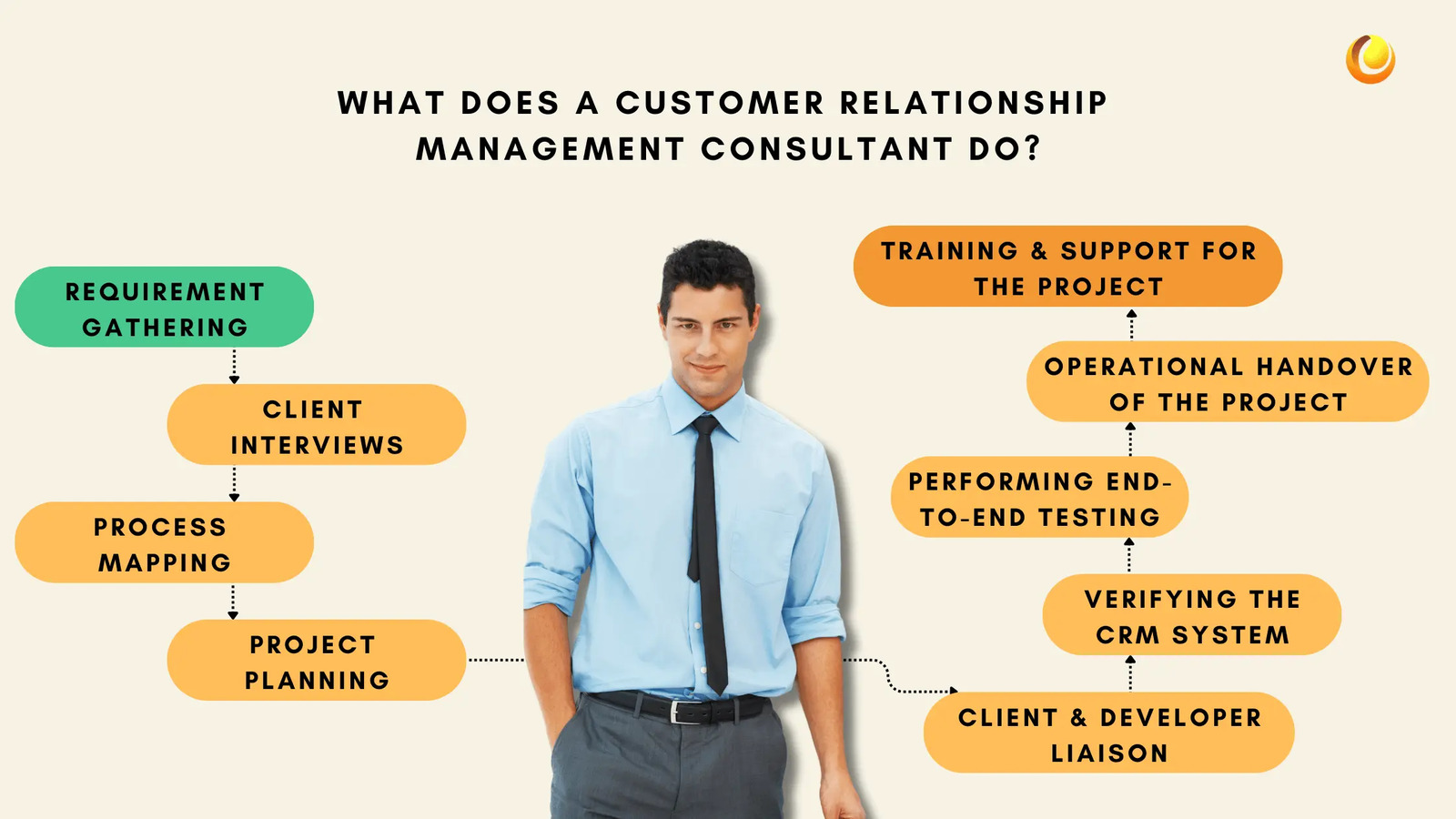
Let us now get into the responsibilities and tasks that CRM consultants handle, outlining the value they bring to businesses trying to enhance their CRM systems.
1. Requirement Gathering
The first thing that a CRM consultant needs to do is to understand the requirements and objectives of the business. This stage is referred to as requirement gathering where one works hand in hand with stakeholders such as business owners, managers, and team leaders to find out what the business would like to accomplish through the use of the CRM system. This will be the basis for a whole CRM strategy.
The expert CRM consultant knows about all the features and functionalities of various CRMs to ensure that the gathered requirements are realistic and in line with the long-term goals of the business. This may be related to complex workflows, customer pain points, or pinpointing areas where automation will improve efficiency. A CRM consultant will ask some very astute questions and often guides clients to realise requirements they might not have considered otherwise.
For instance, a retail business might require features in CRM that give an edge in customer-segmented and targeted marketing. A service-based company, for example, would require the functionalities of tracking service requests, managing customer appointments, and service level agreements.
2. Client Interviews
Client interviews follow logically once the business requirements have been identified. The expert CRM consultant does deep interviews of key personnel in departments throughout the business. These are meant to elucidate the role that various departments play in contact with the customers, what the department requires the CRM to return to them, and how it may be customised to serve the needs of those departments.
Such interviews would help gain insights into the customer touchpoints and interactions that occur at each stage of the customer journey. A sales team, for instance, may need a CRM to track leads and opportunities, whereas a customer support team may need support ticket management tools and mechanisms to handle customer complaints.
Talking to stakeholders will enable CRM consultants to come up with extensive information about each department's particular needs so that the system is fully customised to support the business in the achievement of objectives.
3. Process Mapping
After requirements and interviews, the CRM consultant works on process mapping (another critical task to engage in). It basically means diagrammatically drawing out the current workflows and business processes to see how the CRM system will fit into those processes. It allows the expert CRM consultant to visualise the handling of customer data from the very first contact to post-sales support, ensuring all touchpoints are covered.
For instance, an organisation could have a sales department, a marketing department, a customer care department, and even more. The CRM must integrate into these departments by extracting information from each different touchpoint. It must ensure that there is a smooth flow of information between the departments, but it has to map all these processes first to make sure it does not skip the critical customer interaction and assist the business in its engagements.
Process mapping also helps to identify inefficiencies or gaps in the existing processes and offers opportunities for streamlining and optimisation. For instance, the expert CRM consultant might point out repetitive tasks that can be automated or areas where data entry can be standardised.
4. Project Planning
After the mapping of business processes, the subsequent activity is project planning. Planning an implementation process is an important part of the activities of a CRM consultant, especially defining clear-cut milestones and timelines along with proper resource allocation so that the project is delivered on time and according to budget.
In this phase, the consultant will develop the detailed project timeline, including configuration, integration, testing, training, and deployment. He or she will also manage expectations through a clear definition of the scope of the project to prevent scope creep and ensure delivery according to the agreed-upon specifications.
In this phase, an Expert CRM Consultant might also identify the risks and come up with contingency plans to ensure that the risks are mitigated when they arise during the implementation process. Some of the issues include delays in data migration, lack of staff training, and problems associated with integration with other systems.
5. Client & Developer Liaison
The expert CRM consultant, therefore is a bridge between the client and developers. It is he/she, who would interpret business requirements to technical specifications for the developer, which he will use in tailoring and configuring the CRM system. It's a very critical step because it will ensure the system has been tailored towards business needs yet it is technically feasible and efficient.
For example, a CRM consultant might design custom fields for developers, specific workflows or develop an integration with other business systems, as well as marketing platforms or accounting tools. They ensure that the business requirements are communicated and that the technical team delivers the correct solution.
The expert CRM consultant at this stage also makes sure that the developers understand the unique challenges and nuances of business processes, thereby ensuring that the CRM solution will be implemented in a manner that supports business goals without disrupting operations. If you really want to grow faster and avoid mistakes in the present and future while implementing CRM, then you must hire an expert CRM consultant.
6. Verifying the Solution Matches the Business Requirements
Once the development and configuration phases are over, the system is checked by a CRM consultant regarding whether the system meets the original business requirements. This stage is about checking the functionalities of the CRM to ensure that the system is correctly configured to track customer interactions, manage relationships and align with the business processes mapped earlier.
This process is commonly associated with user acceptance testing (UAT) in which the expert CRM consultant works closely with key business stakeholders to test the functionalities of the CRM in the context of the business. All its features should work as they do in an everyday situation- automated workflows, processes for data input, or even reporting. Discrepancies and issues will trigger a collaborative problem-solving exercise involving the technical team and the expert CRM consultant.
7. Performing End-to-End Testing
The CRM system will be tested end to end, so when all its components are put together, every process from data entry to reporting will work. This is something that the expert CRM consultant will oversee, and he or she will make sure that everything works in concert.
The CRM consultant will also verify that the system handles various types of customer data appropriately, maintains security, and ensures compliance with data protection regulations during this testing phase. For example, if the business is in a regulated industry, such as finance or healthcare, the expert CRM consultant ensures that the CRM system meets legal compliance requirements for storing and managing customer data.
8. Operational Handover of the Project customised
CRM system will be handed over when the system is ready for the deployement after it is tested. The CRM consultant hands over the control of the CRM system to the business at this stage. The expert CRM consultant ensured that he/she hand over all the neccessary documentation, user manuals & training material, so the business can start running the system on its own. This phase often involves creating a knowledge transfer plan to ensure that all stakeholders are equipped with the skills and knowledge needed to use the CRM effectively. The consultant may hold hands-on training sessions to familiarise staff with the CRM’s features, including data entry, workflow management, and generating reports.
9. Training & Support for the Project
Even after implementing the CRM system, the job of an expert CRM consultant is hardly done. A proficient CRM Consultant trains and guides people to meet the changing requirements of the business over time through the CRM system. Training often comes in for new employees or those requiring more profound knowledge of the system.
Furthermore, CRM consultants offer ongoing post-implementation support, troubleshooting any issues that arise and recommending updates or enhancements to the CRM system. Whether it’s helping the business adjust to changing customer needs or providing advice on optimising the system, expert CRM consultants ensure that the CRM continues to deliver value long after it’s been implemented.
How to Customise a CRM for Your Business?
Customising a CRM system to fit the unique needs of your business is important to ensure that it adds value. Here are several critical factors that an Expert CRM Consultant considers when customising a CRM system:
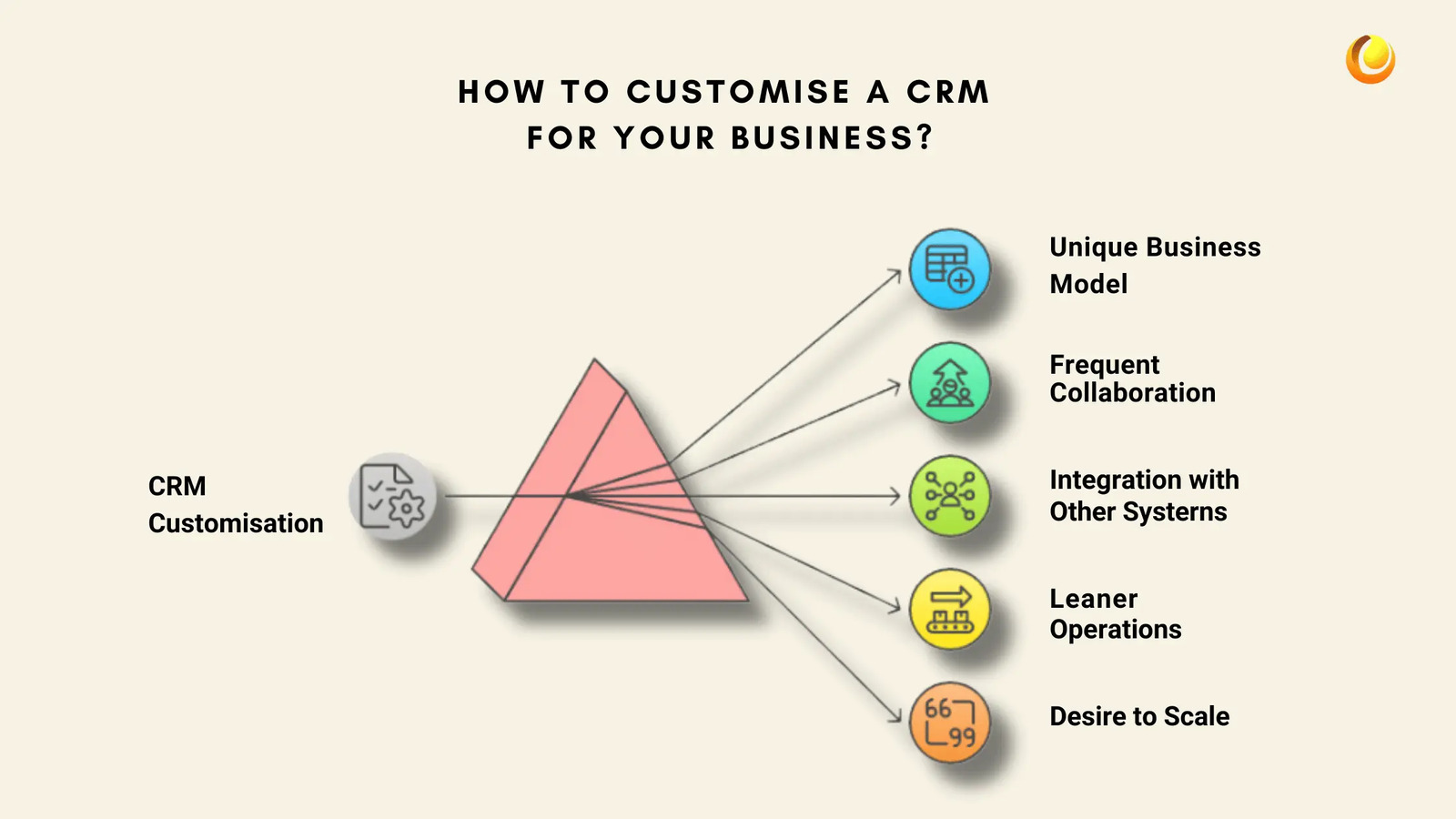
Unique and Complex Business Model
Every business is different & so are its objectives and requirements. Be it retail, service, manufacturing, or any other type of industry, customising the modules, workflows, and automation in the CRM according to the needs of the specific goals and objectives of the business is important. An expert CRM consultant analyses the business model and moulds the CRM system to meet those needs.
Frequent Collaboration
It mainly involves collaboration between the consultant and the clients where 1-to-1s and group interviews are conducted to map up the current business processes and see areas with potential problems. This ensures that the project is managed effectively since the CRM solution is aligned with the business's goal and delivered to the agreed scope, timeline, and budget.
Integration with Other Systems
Most companies have different systems for various purposes, such as finance, marketing, project management, and sales. An Expert CRM Consultant will develop the integrations needed so that the CRM system can communicate properly with other business systems. The integration will then help to get rid of the silos and improve data flow and smooth running of operations within different departments.
Leaner Operations
An important benefit of a CRM system is business process facilitation. An expert CRM consultant analyses the existing workflows and scopes out the areas for improvement. By reducing redundant tasks through automation, it makes the processes more efficient without much manual exertion.
A Desire to Scale
As a business grows, it will be required to scale its CRM. A consultant will be important in designing a scalable CRM system, which will accommodate the growth of the business. That may include flexible data models or adding functionality to support new processes as the business evolves.
Common Integrations for a CRM System
Integration of a CRM system with other tools and platforms is very essential to ensure data flows smoothly across the business. Some comm
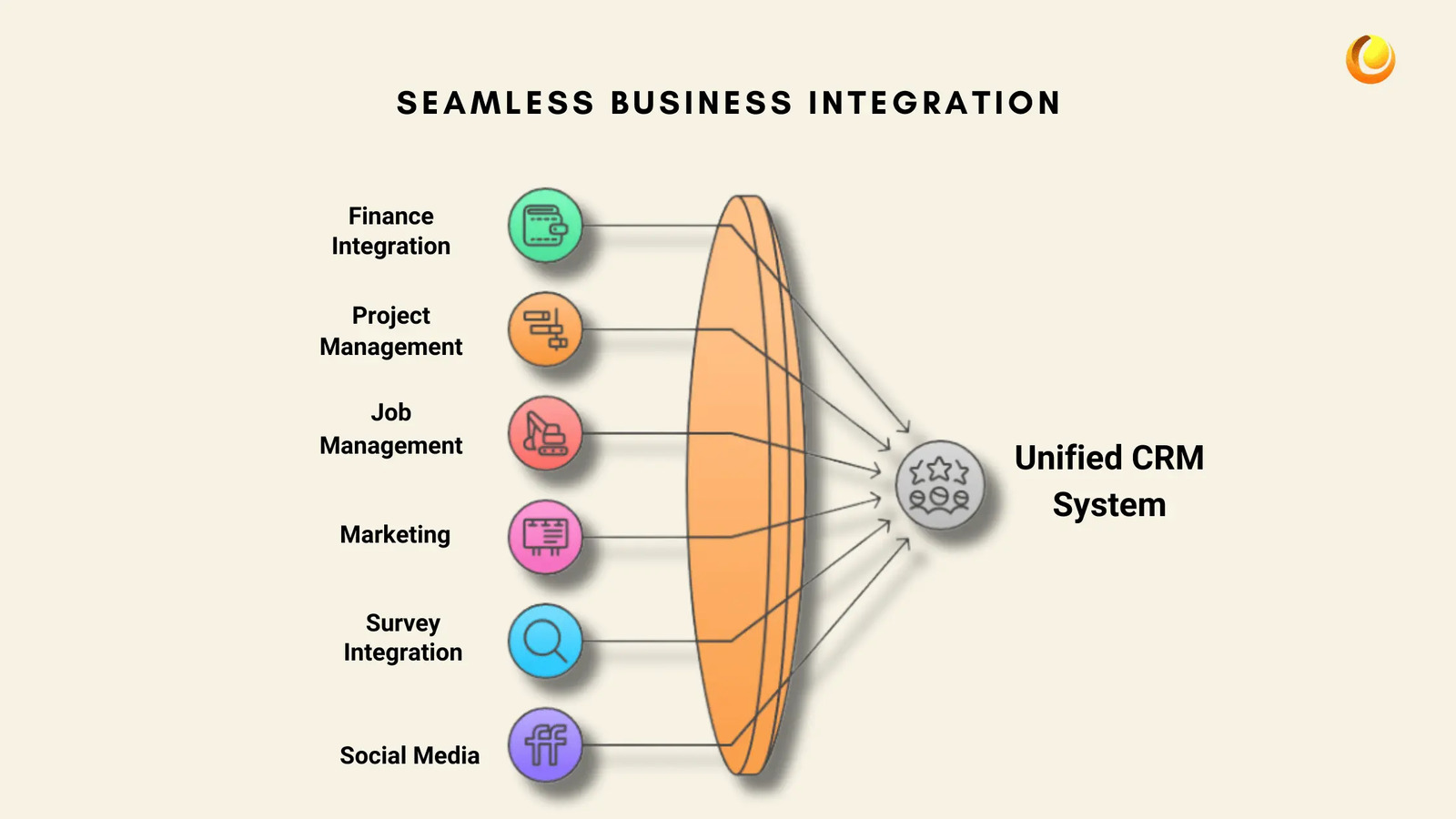
Finance Integration
Through its integration with a financial system, the business gets access to real-time, pertinent financial data and information, facilitating easier and automated invoicing and billing while better tracking revenues and, when so integrated, getting real-time insight into how often a sales organisation has made timely payments by the client.
Project Management
In simple words, by integrating CRM with project management software, customer-related projects can be tracked better. All the timelines and resources associated with the project are mapped against client contact interactions, which ensures that the business remains organised while delivering client needs within stipulated timelines.
Job Management
Job management integration enables the acquisition and updating of all job-related information in the CRM. This is very helpful in industries, like construction, consultancy, and maintenance, wherein the job status and updates with the customers should be managed critically.
Marketing
CRM integration with marketing platforms enables a business to craft a campaign personalised for individual customers using customer data. Targeted email marketing, customer segmentation, and campaign tracking can be accessed all in one platform. Some expert CRM consultants also have an in-house marketing team as well. You can also take it as an advantage.
Survey Integration
CRM systems integrate a survey tool to gather valuable customer feedback. This integration allows the tracking and monitoring of customer satisfaction, and pain points, and improves the product or service accordingly based on client input.
Social Media Integration
The integration of the social media system with the CRM system allows firms to track various social media interactions and communicate with customers directly over these channels. This integration thus helps businesses reach out to clients, respond in a timely fashion to inquiries or questions, and analyse data from these social media.
Enhanced Data Collection via Forms
With an integration of form into the CRM system, there is direct capturing of information about clients and prospects. Lead captures, signups and many other types are streamlined in integrating the collection of data centrally. This can also be done by an expert CRM Consultant.
Document Signing Apps
The integration of document-signing applications like DocuSign and Zoho Sign in the CRM system helps streamline the contract-signing process for businesses. This reduces administrative overhead, speeds up contract management, and ensures that all client communications are stored in the CRM. User CRM tools, they help you in achieving better results faster.
Conclusion
The role of an Expert CRM Consultant is pivotal in ensuring that a CRM system not only meets but exceeds a business’s unique needs. From gathering requirements and mapping processes to customising the system and integrating it with other tools, an expert consultant ensures that the CRM works seamlessly within the company’s existing workflows. Their in-depth understanding of both business objectives and technical requirements guarantees that the solution is aligned with the long-term goals of the business.
Additionally, an Expert CRM Consultant offers continuous support, training, and guidance to ensure that the CRM system remains effective as the business grows and evolves. Their expertise allows businesses to maximise the value of their CRM, improve customer interactions, and streamline internal processes, all while ensuring scalability and adaptability.
In essence, the strategic input of an Expert CRM Consultant can significantly enhance a company’s ability to manage customer relationships, optimise operations, and ultimately, drive business success. By leveraging their experience, businesses can implement a CRM solution that fosters growth, improves efficiency, and delivers a superior customer experience.





